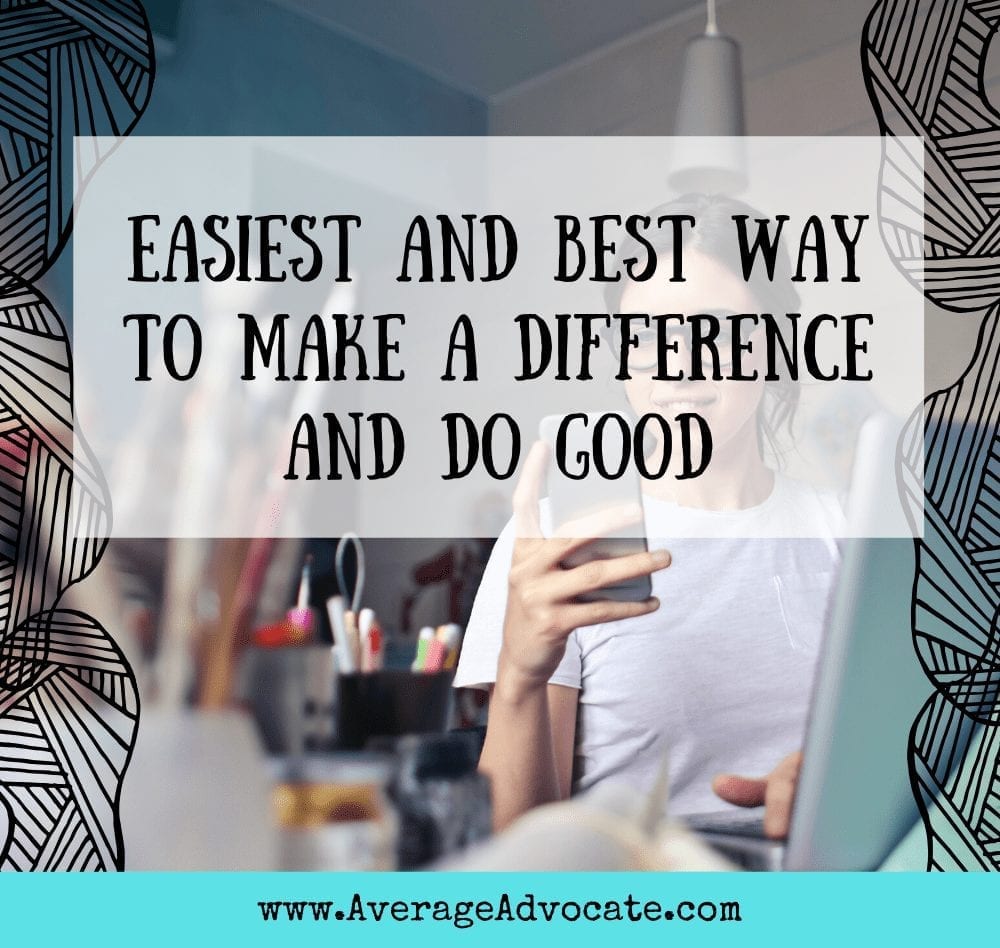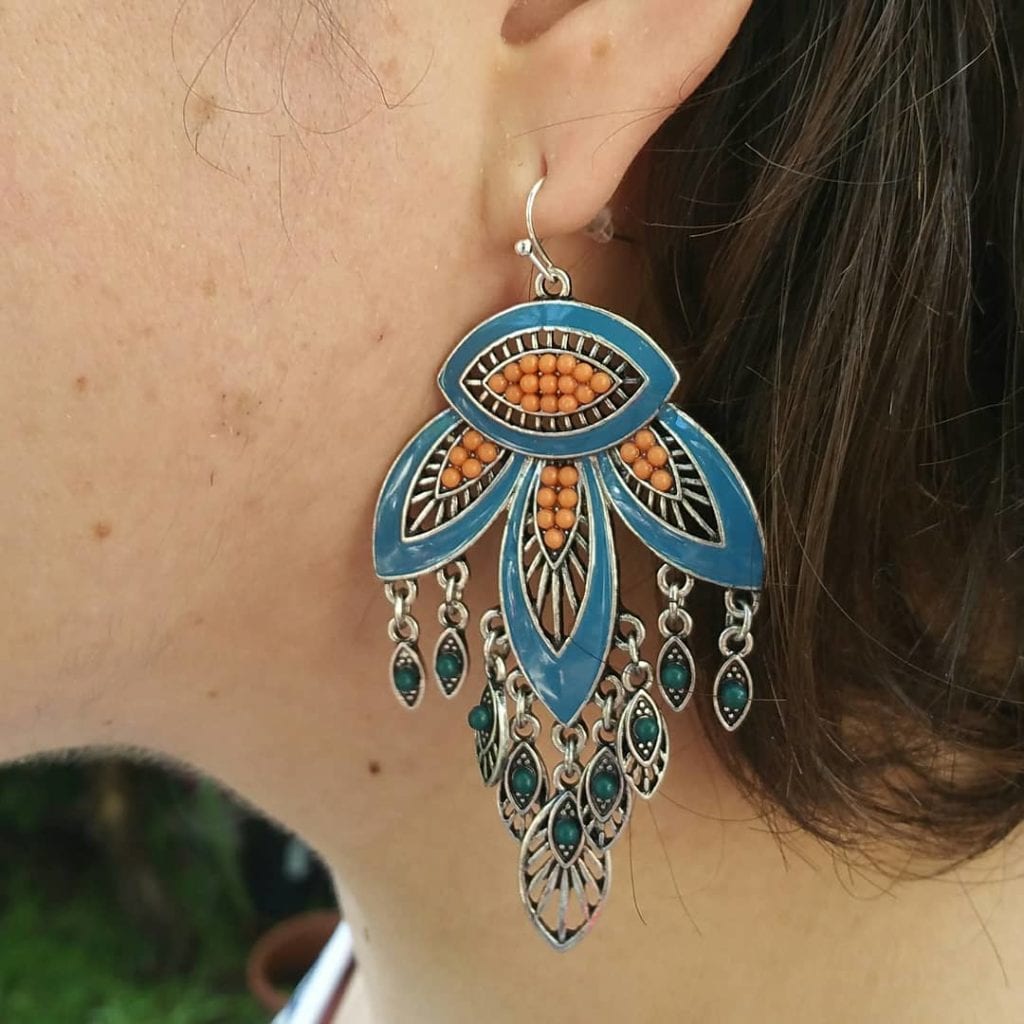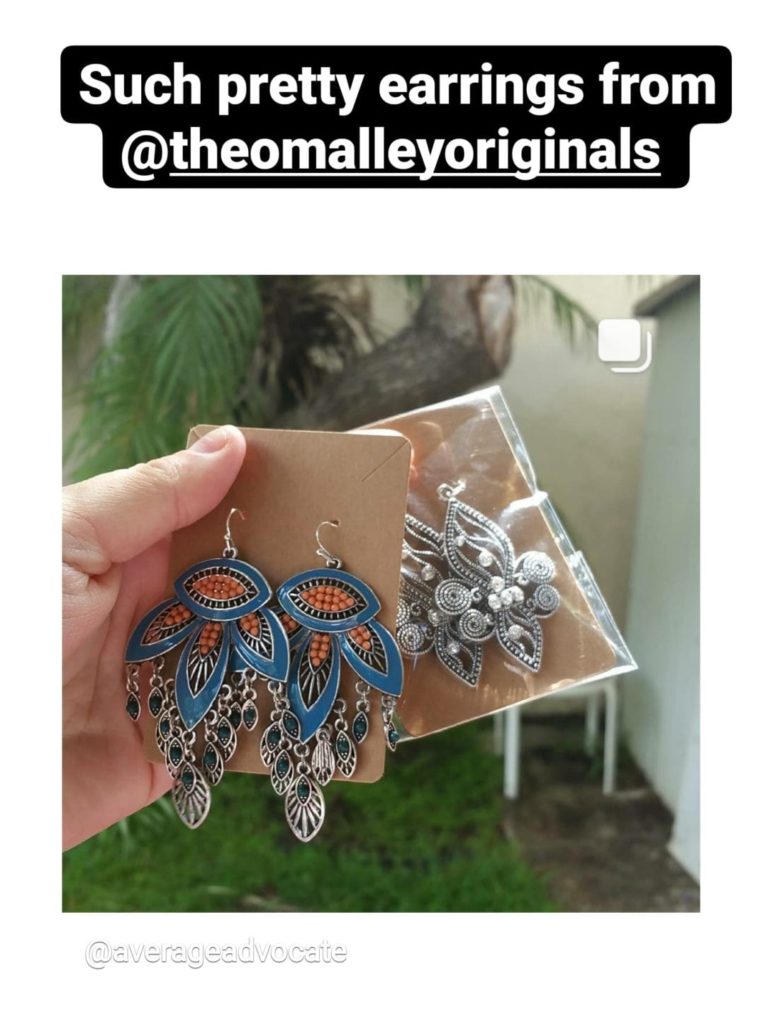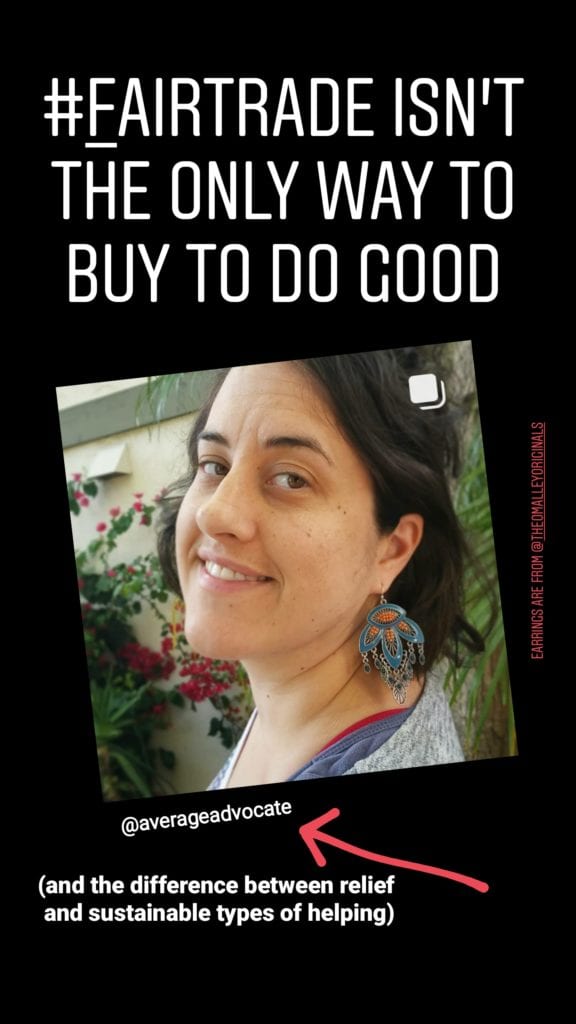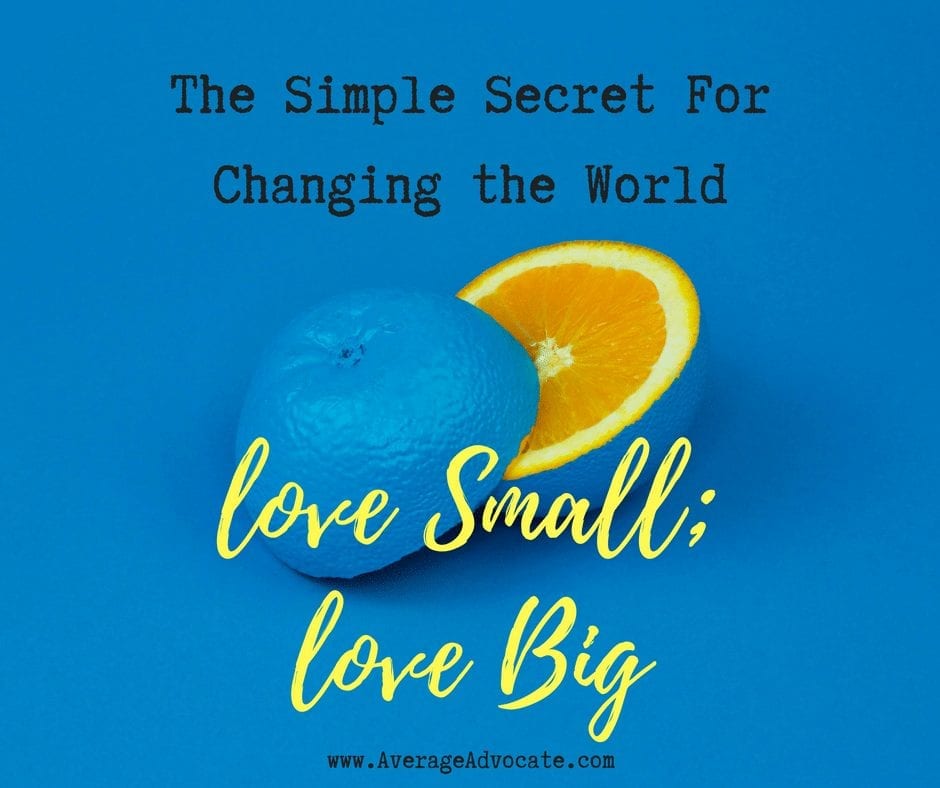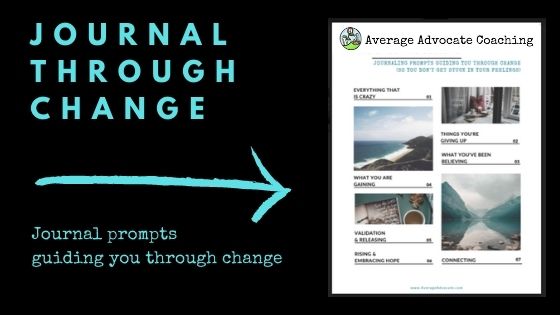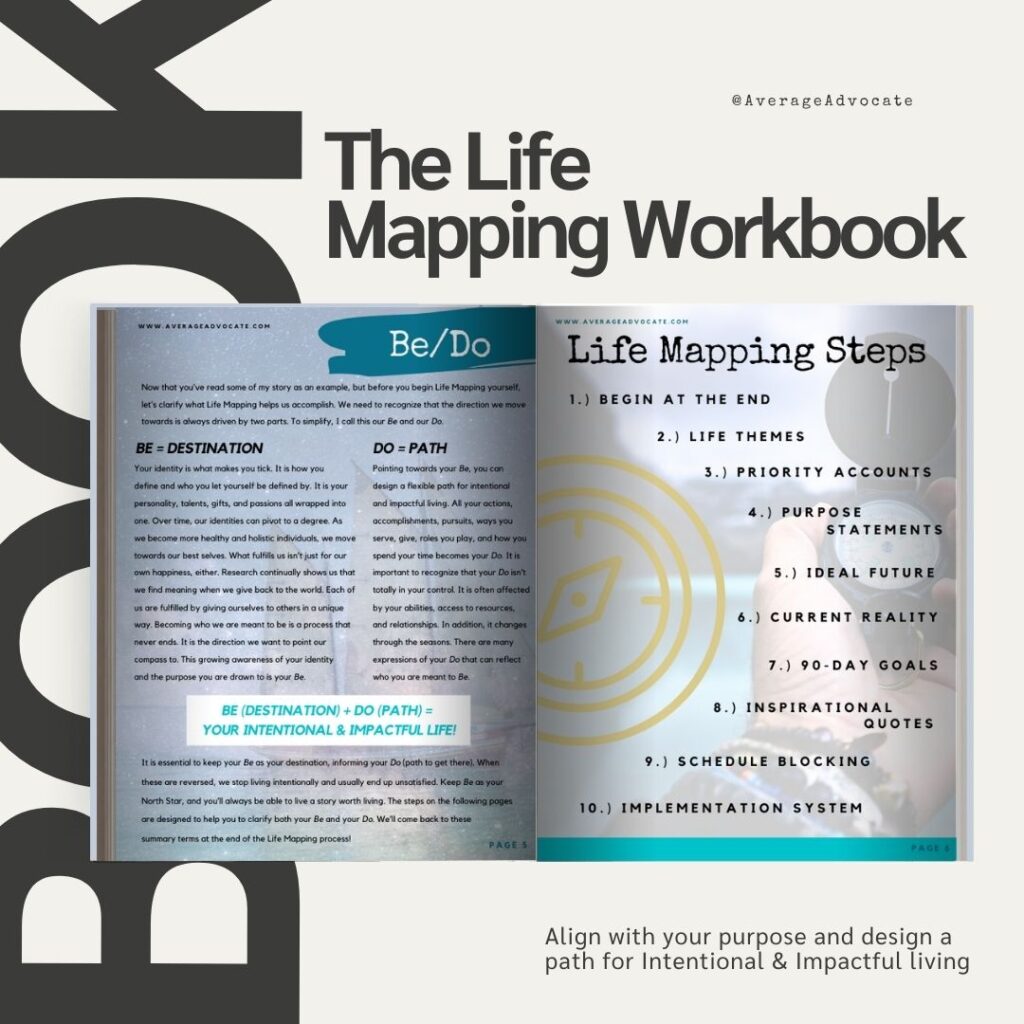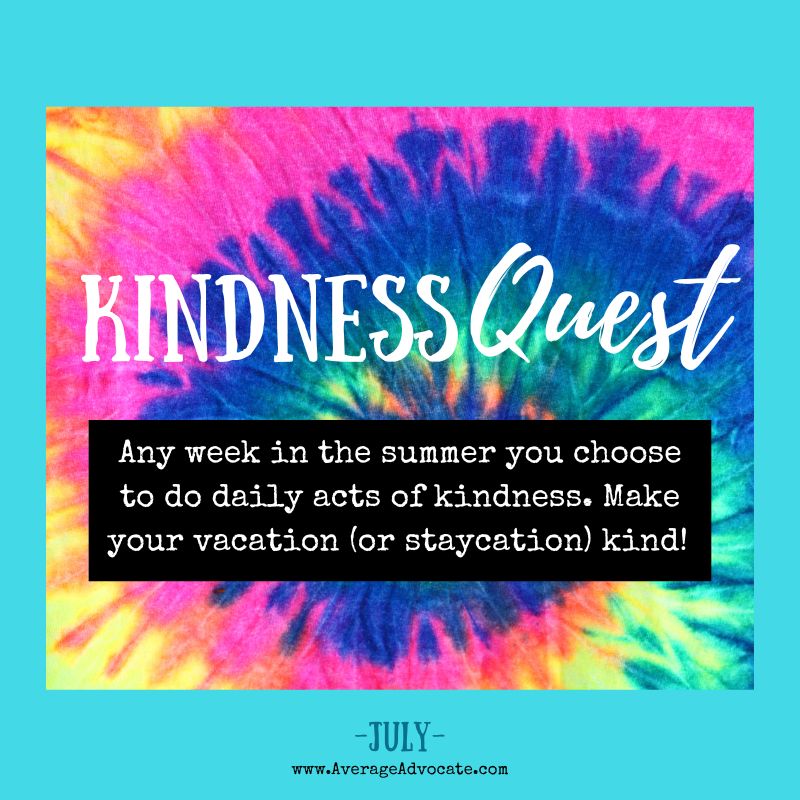My new earrings are fair trade or locally made. But they still do good! Actually, let me tell you a secret. This is the easiest and best way to make a difference in the world. And it might be a surprise to learn that it isn’t by giving money to a cause or starting a non-profit. For most of us, the best way to change the world is by supporting small businesses or helping people start them.
New Earrings Can Be Better Than Giving a Meal
I am grateful that my family is of those who can work from home. So far, we haven’t been hit financially because of COVID-19. A couple months ago I was talking about keeping our eyes out for opportunities to be generous, especially for those of us who haven’t needed our government stipend for survival.
Soon after, I saw one of those opportunities. My friend Jen posted about her friend’s jewelry, O’Malley Originals. The artist, Lisa, is undergoing cancer treatment and her only source of income these days is her small jewelry business. She had some fun dangling pieces I like. We got into a conversation on Instagram and I bought two beautiful sets of earrings.
She got paid. I love my earrings. She thanked me for my business. I asked her if I could share this little story about why I bought her jewelry. It seems weird to share as nothing profound occurred. But, these common moments greatly impact the world. Under the surface, they are profound. Something good happened in that transaction and we need to be reminded of it. We have the power to do good through what we purchase.
Two Ways We Can Help
Truthfully, I felt a little guilty buying myself earrings in a time like this. I love earrings, but I don’t need them. People are greatly struggling around me, needing food, and here I am buying myself earrings? How is that okay? How is that doing good?
There are always need and they are almost always helped in only two ways. The first is relief work. This is usually emergency related and humanitarian in nature. It included providing food, emergency housing, healthcare, the basics. The second is sustainable development, helping increase the opportunity and chances for others to make an income. This might look like investing in someone’s education, clean water supply (so a community isn’t chronically sick or spending all their time searching for water) or supplying internet access to homes without.
Sometimes the lines between these two ways to help gets blurred. When a dependency on aid (relief) is fostered, this is when helping becomes hurting.
Although I might give to both, I often choose to be generous in ways that help others care for themselves (sustainable development). Why? It is more empowering long term and it helps me avoid helping in a way that could lead to dependency. But something I love a lot about this is that it usually creates equal-footing. Investing sustainably fosters dignity.
In fact, it can create so much equality between the giver and receiver that we don’t even see it as helping others. That is why we don’t consider supporting small businesses as being generous! Why would it be? We get something in return!
But our choice on how to give is still there. We have purchasing power. And this is why supporting small businesses is usually the best way to be generous.
What Types of Small Businesses Do Good
It took me about ten years of advocacy and humanitarian work to recognize that starting and supporting small businesses would be the best way to make a difference. It is actually why I turned Average Advocate into a business. Sure, there were other reasons too–but one of the primary reasons was that I could reinvest earnings in helping others, including hiring others and starting non-profits. I am still at the beginning of that road, but even my small business has partially been able to launch Blackout Trafficking and has paid others, helping others earn their own income.
B-Corps are some of the most widely known businesses that are legally committed to give to good causes. I also often talk about buying fair trade, and usually business that market as “direct trade”, “ethical”, “sustainable” or “artisan made” are also typically intentionally using their small businesses for doing good.
But, as I specifically wanted to point out (O’Malley’s jewelry acting as my case-in-point) purchasing from the everyday small business can be just as valid of a way to make a difference as buying fair trade is. It is fair trade. Even if we can’t always buy from people on the other side of the world, helping them out of poverty (or whatever cause matters to us), often we can help our own friends, community, or just buy some handmade good from a stranger (this is why I bought my face masks from Etsy instead of Target).
Supporting Small Businesses Through Microloans
Today I spent sometime with my daughter choosing four new people to give $25 loans to at Kiva.org. This is from the same money ($225) I’ve been loaning for almost fifteen years. To me, over a decade ago, it was a one-time gift. But it has been used over and over again, multiplying to $1600 in $25 increments to help 63 everyday ordinary people (like myself).
Why microloans? It is an effective way to combat poverty. In truth, though, it is simply supporting small businesses. Often I am giving someone capital to start their business of keep it running. They might need a loan for crop seed, other times it is a motorcycle to make deliveries, or other times it is supplies for their restaurants.
Microloans embodies the classic proverb, Give a woman a fish, she can eat for a day. Teach a woman to fish, she can eat for a week. But give a woman a fishing pole and she can feed herself and her kids for a lifetime (and help her community too)! In case you couldn’t tell, I almost exclusively loan to women. Not that men don’t need the money. I just know that woman usually have a much larger unseen story, often struggling in many other ways to make-ends meet. As I am conscious of this, I throw whatever I can at the women in my “loan portfolio” because they need all the support they can get.
My kids love helping me find new people to loan to, which is a great way to raise little world changers and talk about living justly. Today we loaned our money to:
- Fatimata, a mom of four in Burkina Fosa who is using her loan to buy peanuts to sell!
- Renee, an Arab in Israel who’s has a hairsalon that has been closed because of COVID19. She is trying to reopen within the new health parameters and she has leaks in her roof that need to be fixed.
But, for the first time, I loaned to help various field partners who give out the loans or do non-profit work. Honestly, I don’t know as much about this except (as noted here: COVID-19 & Human Trafficking) those who serve are struggling because of the novel coronavirus. Loaning to help the organizations who give out the microloans is something new to me.
Side note: It is an idea that is not being used accross the board, but I am curious if it is more effective. Most nonprofits, ministries and NGOs are asking for more donations to help them through this season (not to fund the work they are doing, but operating expenses). But asking for a loan means that someday (ideally) that money will come back to the ordinary person. This might result in more people giving now, as the money will come back to them. It isn’t the trend for the nonprofit world to ask for loans, but I wonder what the difference would look like long-term.
Feel free to loan through Kiva too, here.
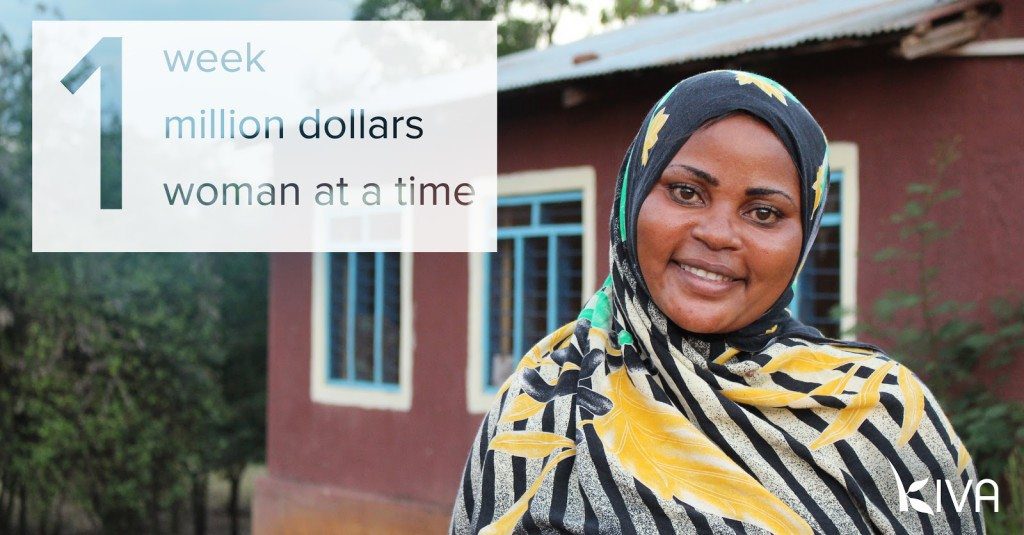
Tips For Supporting Small Business While Doing Good
I don’t actually have too much to say about this, simply that just by considering if you are supporting a good small business, then you are on the right track. Here are a few other the things I use.
- Look for the story (Like O’Malley’s Originals were just nice earrings until my friend told me it was Lisa’s only source of income during COVID-19 and her cancer treatments)
- Prioritize small businesses run by those working to overcome an economic disadvantage (example: the kid whose other option is an engineering internship vs. this kid whose other opportunity is a gang)
- Prioritize small businesses run by women (usually there are more set-backs, less opportunity, and children involved)
- Prioritize small businesses run by those of color (guys, racism and opportunity is still a thing)
- Ask if they are giving back in some way ( I always ask those who approach me to be an influencer for their brand this question. Often they are like, “Huh? What does that mean?” I don’t work with those guys)
- Avoid pyramid businesses (I know there are a lot of opinions about this, so don’t hate. But more often I see them not actually helping people earn an income unless you are lucky and are at the top of the pyramid.)
- Consider how the business runs (If they have employees do they treat them fairly? Are they concerned about helping in their community? Do they cut corners or shaft people to grow their business?)
This is obviously not an exhaustive list, but might help you get started! Better yet, in the comments, give me your ideas!
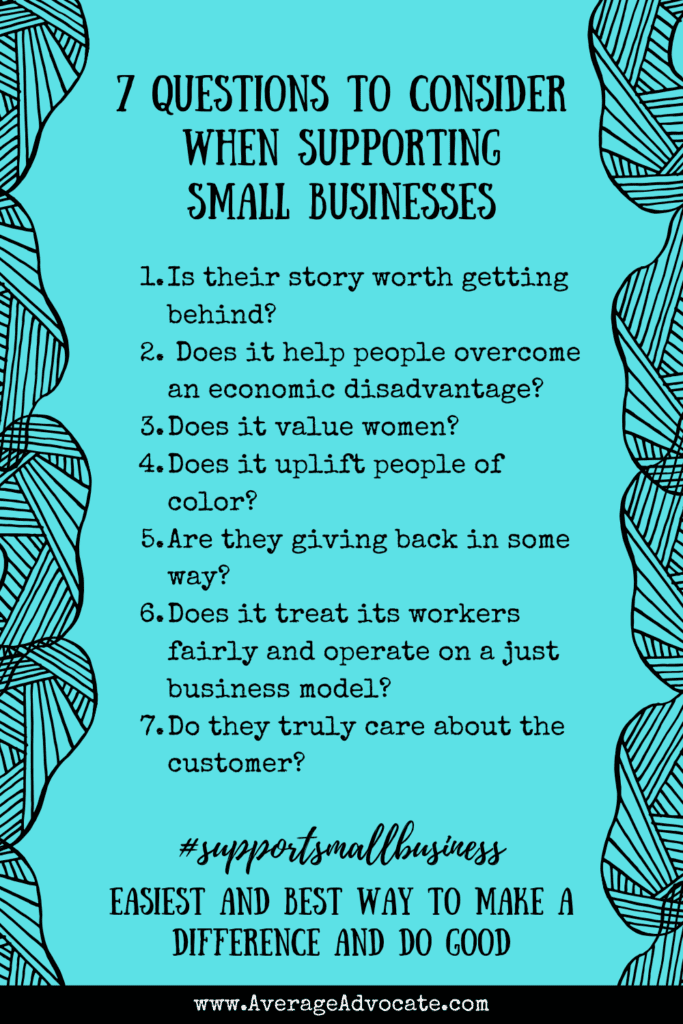
Supporting Small Businesses During COVID-19
If tomorrow my family could not financially support ourselves what would I hope for? I would hope that someone would hire me or pay me for what I could give. So I am trying to do that for others too.
Right now, because of unemployment during COVID-19, supporting small businesses is even more important. Many large corporations can keep themselves afloat for awhile. But that small coffee shop doesn’t have enough savings to hold them over through quarantine. Or that mask I bought on Etsy might also be someone’s only source of income, just like O’Malley’s Originals jewelry is.
Besides O’Malley’s Originals, I am close to a family serving in Europe whose watercolor and ink paintings of Paris I am buying. A friend, who runs the Do Good Shop, asked me to encourage people to shop from them. I found a local coffee shop and farm to buy stuff from. I have friends helping me with small jobs. I’ve been looking into hosting speakers in an online format.
Being kind and loving others might not always be helping our neighbors or donating to a non-profit. But maybe it is hiring a friend to do that project for you, buying artisan made soap, or getting a new pair of earrings.
I realize supporting small businesses just looks like normal economics, buying and selling. But maybe reframe to consider it as generosity too. This type of helping doesn’t even look like charity it is so good! 🙂

